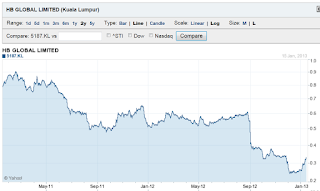Article in The Star by John Loh: More cases deemed ‘not fair but reasonable’
"In March 2010, the SC had - in an effort to raise the standard of independent advice by getting independent advisers to conduct deeper analysis and disclose more information to shareholders - issued a consultation paper that led to the additions to Practice Note 15 of the Code on Takeovers and Mergers 2010.
The revised guidelines took effect from Nov 1 last year.
The new rules essentially decoupled the terms “fair” and “reasonable” as two distinct criteria, with “fairness” referring specifically to valuation and “reasonableness” to elements other than valuation.
“The decoupling of the terms will further ensure that independent advice circulars are more easily understood, transparent and provide clear bases to justify a recommendation,” the SC had said."
Thirteen independent advises in the above table:
- 4 times "not fair but reasonable", language that is used when the price offered is less than its fair value, but at least it offers a option for the shareholder to sell (instead of holding shares in an unlisted company);
- 4 times "not fair and not reasonable", not necessarily against the wish of the majority shareholder, it could be a take-over offer at a low price where the majority shareholder wants to keep the company listed;
- 5 times "fair and reasonable".
Two remarks:
- This is a huge change from the past when almost always deals were deemed to be "fair and reasonable", the change is good; the average standard is also better than in the past (with some exceptions);
- Why are so many proposals deemed to be "not fair"? Do the Board of Directors fulfill their fiduciary obligation to work for all shareholders? Can they not come more often with deals that are deemed to be "fair"? In the case of privatizations, have they really tried to unlock more value?
The SC and Bursa Invite Comments on Proposed Best Practice Guide on Independent Advice Letters, latest by tomorrow (January 31, 2013). The documents can be found here.
My comments regarding this Guide:
- In general the guide appears to be good;
- However, guidelines are only of use with strict enforcement. SC really needs to come down hard on errant independent advisers who write biased reports in favor of the majority shareholders;
- DCF (Discounted Cash Flow): in itself a good tool in certain areas (where reliable predictions can be made), unfortunately it is often abused (to come up with sky-high valuations) and therefore I would recommend to do away with it, my previous posting about this can be found here;
- I would stress reasonableness in valuation: for instance if a certain asset is acquired not too long ago and the current valuation is very different, good reasons should be given, I often miss this common sense approach;
- Data should be as up-to-date as possible: for instance I still often miss an up-to-date balance sheets and profit and loss account; also if the amount involved is large there really should be a recent audited account. In the KFC case the independent adviser compared the company with other companies based on share prices of one year old, this should not happen;
- For asset heavy companies like property developers or plantation companies: revaluation of assets should be done if the last valuation is done more than 3 years ago; Glenealy Plantations was privatised with its last revaluation done 14 years ago, in the midst of the Asian Crisis;
- Margin of safety: if the value of an asset depends on all sort of future conditions being met, then there really should be a decent margin of safety;
- Executive summary: I would prefer this always to be done.
Some general comments, not related to the Guide:
- A random assignment of a (non-conflicted) independent adviser to a specific case would increase the chance that the independent advisers is really independent; at the moment companies (that is the Board of Directors) can choose their own independent adviser;
- Independent advice should be send together with the main document, or at least not much later.














